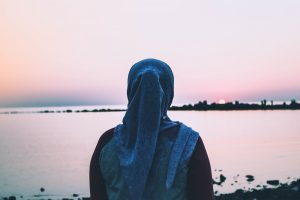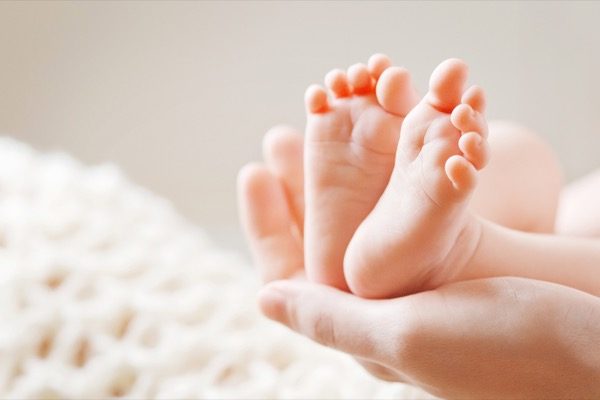
Women’s Section, The Review of Religions
Since 2013, World Hijab Day has been celebrated internationally on February 1st. It was the initiative of New Yorker Nazma Khan (#WorldHijabDay), and its purpose is ‘To encourage women of all religions and backgrounds to wear and experience the hijab.’[1] It recognises that millions of Muslim women choose to wear the hijab (veil) and live a life of modesty according to Quranic teaching[2]. The Review of Religions Women’s Section contacted Muslim women across the globe and asked them to share their thoughts on the significance of the Hijab, in the hope of promoting a better understanding of this Islamic practice. These Muslim women responded enthusiastically, and their insightful responses are presented below:
Mariam Andersson Malik,
Math teacher, Metuchen, New Jersey, U.S.:
‘Wearing the hijab is a big part of my identity. I would feel very underdressed without it. It is a constant reminder to myself that I am representing Islam in my actions and how I interact with my colleagues, neighbours, and the people I meet. I definitely feel a different level of respect at work.
One of the many joys of wearing the hijab is feeling a connection to other Muslim women, regardless of race, ethnicity or nationality. True sisterhood!’
Munazzah Chou,
MBBS, MSc, FRCOphth, England, UK:
‘At college I remember being asked whether my headscarf was a fashion statement; it was unusual to see anyone in a head covering in that area at the time. These days when I wear one to work or out and about, there is no such confusion because the hijab is not infrequently making headlines. The hijab hasn’t held me back in any way and has additionally given me a different perspective and experience of the world from others, which I am certain has been to my advantage spiritually.’
Amnah Khan MSc
Research Scientist, Malta:
‘I, as a valued part of society cover, myself with the hijab. When asked by others, I have always responded by saying it gives me a sense of security and I feel secure as a result. I remember being asked by other women in Malta that given the hot weather here, I must be boiling in this attire. They were further puzzled how as a scientist, I practice Purdah (the veil). I explained that on the contrary, given the high rates of skin cancer in Malta, and due to my own personal research into harmful cancers, I feel it protects me from harmful ultraviolet rays found in direct sunlight. It’s of a very light material, saves me from sun burn, and the overall feeling of peace and comfort it offers, can only be experienced by women trying it out for themselves.’
Emma Ahmed
SEN teacher, Leicester, UK:
‘I wear hijab as a way to protect myself from the unfair portrayal of women being inferior in society. The hijab masks my femininity, allowing me to be judged based on my values and actions rather than my appearance. This allows my achievements to be given equal weighting to that of a man. Wearing hijab allows me to feel liberated and empowered, and I am given a voice which is taken more seriously. Since wearing hijab, I have participated in lots of talks, spoken on radio and had my articles published in magazines. Before wearing hijab, I would not have had this type of confidence.’

Dr Aisha Qayyum, MBBS, MRCGP,
Fareham, UK:
‘As a GP my job involves following up on patients for months or even years and hence it gives me an opportunity to develop a doctor-patient relationship with them.
At work, it is very important for me to identify as a Muslim through wearing my hijab and with each patient interaction, I feel that I am representing myself as an Ambassador of Islam. I make a conscious effort to listen to my patients and develop a good doctor-patient relationship.
I want my patients to go back and reflect that the doctor treating me was a Muslim and through this I try and spread the message of the beautiful teachings of Islam, which unfortunately is being portrayed negatively in the media. This is really important for me.’
Ayesha Malik, LLM (Harvard Law School),
UAE:
‘The hijab is so much more than a mere garment worn on one’s head. Over the years, it has served as a profound lesson in the internal and external facets of our being. It has been a poignant reminder that while we choose to cover certain externalities, the depth and beauty of our souls should shine forth and be visible for all, transcending the physical parameters of our garments. Our hearts and our actions should win people over, not the facade of our external beings. On countless occasions I have felt that without my hijab, this vital life lesson might not have been so powerful and so clear.’
Syeda Maria Daniel, BMedSci (Hons)
Medical Student, University of Southampton, UK:
‘The hijab – for some it may just be a cloth, but for me its significance is beyond what I can describe. From a very young age, I made the independent decision to wear the Hijab, as for me the Hijab signifies peace and protection. It’s one of the most special aspects of my faith. It reminds me that I am a Muslim and that my Allah has given me all the blessings I have in my life. I believe the Hijab represents equality, that I am not lower or inferior to anyone else, while also humbling me and giving me all the strength and faith that I need to pursue my goals. The Hijab. Far from oppression, it represents progression.’
S. N. Ahmed, BSc (Hons), PGCE (Cambridge University),
The Gambia:
‘Throughout our lives, we are often given the advice ‘don’t judge a book by its cover.’ Despite the idiom’s popular usage, it seems a far cry from the reality of society. If it were the case, we’d walk into bookshops with our eyes closed, opening books only to determine whether the inside contained in it what we were searching for.
My cover has been carefully curated, not by society’s ever-changing standards of beauty for women, but to symbolise what I value: my morality, my spirituality, my conduct, my individuality within a collective identity, and perhaps most pertinently in this day and age, my right as a woman to be perceived through my character, rather than trend-oriented external beauty. This represents true freedom to me.
Ultimately, I wear the hijab because God, in His infinite Wisdom, has commanded that I do so. He has commanded I be seen for my qualities, not my cover.’
Mariam Siddiqa, (Research Assistant and Student, Institute of Educational Sciences)
University of Bremen, Germany:
‘When I was a teenager, I couldn’t get used to the idea that women are often reduced to their appearance. I wanted to prove to myself that I could be a successful woman because of my personality, my abilities and my intellect – without exploiting my femininity. This was significantly possible because of my hijab. My hijab is like a mirror to me. It helps me to reflect on my actions. It helped me to free myself from many shallow temptations around me. It shows me the beautiful sides of me, which do not necessarily have anything to do with my appearance. The decision to wear a hijab is not only a decision to cover certain parts of the body, rather it is a conscious decision for a philosophy of life that has increased the quality of my life immeasurably.’

Shamamah A Dogar, M.A. Journalism & Media Management, M.A Political Psychology,
Bournemouth, UK:
‘My Hijab and full-length dress always stood out and helped me in making my identity. I am sometimes judged but mostly highly appreciated. People’s curiosity towards my style of hijab mostly initiates a talk, which ends with me telling them about the Promised Messiahas and always helps establishing my identity and improving my social circle. I feel that people give me a certain, special level of respect being a hijabi girl, and are considerate of my religious obligations. So, every day, I feel more confident, more secure and prouder of my Hijab.’
Dr Munazza Alam, Astronomer,
Washington D.C., USA:
‘My hijab does not limit me, it empowers me. It is a reminder that I can authentically be who I am without hesitation – an Ahmadi Muslim, living and working in the western world. Society today is moving toward acceptance of diversity, and hijabi women are included and celebrated in this. In fact, one quote from a previous interview that I did for The Review of Religions about the impact of my faith on my scientific research, will be displayed on a plaque at the Lowell Observatory’s Astronomy Discovery Center (scheduled to open in 2023). The plaque will also feature my own artwork: a silhouette of a hijabi woman with a galaxy-inspired background. (featured at the beginning of the article).’
These percipient testimonies of Muslim women seem to concur with what the Worldwide Head of the Ahmadiyya Muslim Community, His Holiness, Hazrat Mirza Masroor Ahmadaba said regarding Purdah (practice of the Hijab),whilst addressing Ahmadi Muslim women in 2014:
‘Today, I have spoken particularly about Purdah because it is often alleged that Purdah takes away women’s rights. However, we know that this is not the case, and the truth is that Purdah and Hijab actually establish the true dignity, independence and freedom of women. Hijab does not only give women physical security but is also a key means of giving them spiritual security and purity of heart.’[3]
ENDNOTES
[1] https://en.wikipedia.org/wiki/World_Hijab_Day
[2] Holy Qur’an, Ch24-V32, Ch33-V60
[3] https://alisl.am/e3237




Add Comment